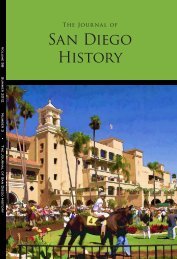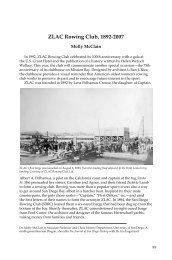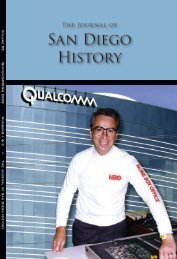You also want an ePaper? Increase the reach of your titles
YUMPU automatically turns print PDFs into web optimized ePapers that Google loves.
Book Reviews<br />
Big Daddy: Jesse Unruh and the Art of Power Politics. By Bill Boyarsky. Berkeley,<br />
CA: University of California Press, 2008. Illustrations, index, and notes. xii+265<br />
pp. $29.95 cloth.<br />
Reviewed by Robert W. Cherny, Professor of <strong>History</strong>, <strong>San</strong> Francisco State University.<br />
Jesse Unruh was one of the most powerful forces in post-World War II California<br />
politics, a larger-than-life figure who transformed both the speakership of<br />
the state assembly and the legislature itself. Raised in poverty on a Texas sharecropper<br />
cotton farm, he used the GI Bill after the Second World War to acquire an<br />
education and then began a lifetime in politics, running unsuccessfully for the<br />
California assembly twice before gaining election in 1954. He became chair of the<br />
Committee on Finance in his second term, chair of the powerful Ways and Means<br />
Committee during his third term, and speaker in his fourth term, serving from<br />
1961 to 1969. He lost elections for governor in 1970 and for mayor of Los Angeles<br />
in 1973, then was elected as state treasurer in 1974 and reelected until his death in<br />
1987. During his heyday as speaker, he was undeniably the most powerful figure in<br />
the state next to the governor, which was as Unruh thought it should be.<br />
Bill Boyarsky reported on state politics for the AP and for the Los Angeles Times<br />
beginning in 1961, just as Unruh began his tenure as speaker. His biography of<br />
Unruh is based in significant part on his own experiences with Unruh and the<br />
legislature, and on the experiences of others he knew as a Sacramento reporter, as<br />
well as research in the archives and interviews with participants. In a few places,<br />
the book reads more like a memoir than a typical biography.<br />
Boyarsky gives us a good picture of this complex personality. Unruh’s drive<br />
for power, according to Boyarsky, was fueled by an anger that was always near<br />
the surface, an anger over social injustice that went back to his poverty-stricken<br />
childhood. His commitment to social justice was coupled with a willingness to use<br />
government to solve society’s problems, an attitude typical of many in the generation<br />
that came to political maturity during the New Deal and Second World War.<br />
To address social injustice, Unruh sought power, and he built a political organization<br />
that provided a model for later speakers. Before today’s stringent reporting<br />
laws for political contributions, Unruh and his close associates collected large<br />
sums from lobbyists and interest groups and used it to support campaigns for the<br />
assembly so that many – probably the large majority – of the assembly’s Democrats<br />
owed Unruh a political debt. His anger over social injustice led to such measures<br />
as the Unruh Civil Rights Act and the Lanterman-Petris-Short Act, which transformed<br />
the state’s role in commitment and care procedures for the mentally ill.<br />
His commitment to the role of the legislature in policy-making led to the creation<br />
of the full-time legislature with adequate pay and an adequate and professional<br />
staff. Under his leadership, legislative hearings became important ways of securing<br />
information to guide policy formation.<br />
At the same time, Unruh was thin-skinned, never forgetting what he considered<br />
a slight, and given to snap decisions, some of which he later regretted. He was<br />
probably an alcoholic and definitely a womanizer at a time when the press did not<br />
pay much attention to such behavior. Always a political moderate, he anticipated<br />
that the Rumford Act would alienate working-class, white Democrats. As a centrist<br />
and cold warrior, he had little use for the liberals of the California Democratic<br />
93


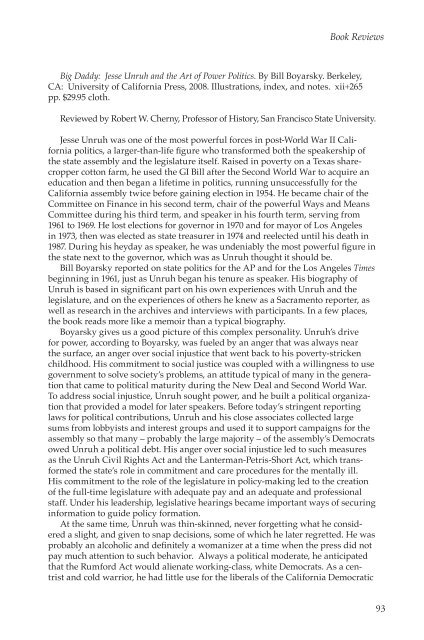
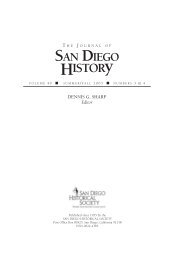

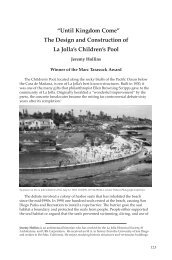
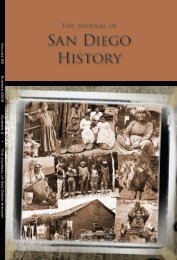
![[PDF] The Journal of San Diego History Vol 52: Nos 1 & 2](https://img.yumpu.com/25984149/1/172x260/pdf-the-journal-of-san-diego-history-vol-52-nos-1-2.jpg?quality=85)
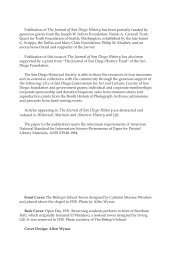
![[PDF] The Journal of San Diego History - San Diego History Center](https://img.yumpu.com/25984131/1/172x260/pdf-the-journal-of-san-diego-history-san-diego-history-center.jpg?quality=85)


